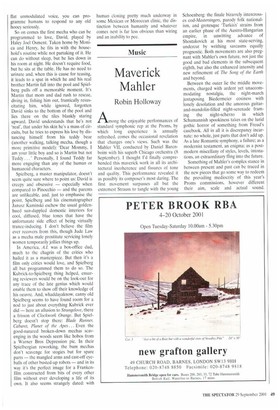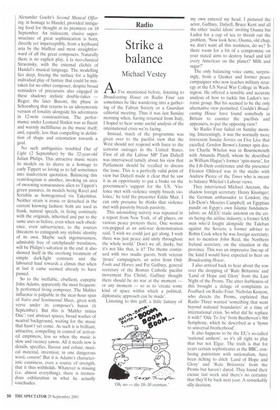Maverick Mahler
Robin Holloway
Among the enjoyable performances of standard symphonic rep at the Proms, by which long experience is annually refreshed, comes the occasional revelation that changes one's views. Such was the Mahler VII, conducted by Daniel Barenboim with his superb Chicago orchestra (8 September). I thought I'd finally comprehended this maverick work in all its architectural incoherence and fissures of tone and quality. This performance revealed it as possibly its composer's most daring. The first movement surpasses all but the extremest Strauss to tangle with the young Schoenberg: the finale bizarrely intercrosses cod-Mastersingers, parody folk nationalism, and grotesque 'Turkish' strains from an earlier phase of the Austro-Hungarian empire, in unwitting advance of Shostakovich at his most state-serving, undercut by writhing sarcasms equally prognostic. Both movements are also pregnant with Mahler's own future, not just the good and bad elements in the subsequent eighth, but also the enhanced intensity and new refinement of The Song of the Earth and beyond.
Between the outer lie the middle movements, charged with ardent yet unaccommodating nostalgia, the night-march juxtaposing Biedermeier cosiness with lonely desolation and the amorous guitarand-mandolin-filled night-serenade framing the night-scherzo in which Schumannish spookiness takes on the lurid gothic horror of something from Freud's casebook. All in all it is discrepancy incarnate: no whole, just parts that don't add up. As a late Romantic symphony, a failure; as a modernist testament, an enigma; as a postmodern miscellany of styles, levels, intonations, an extraordinary fling into the future.
Something of Mahler's complex stance in between present and past can be traced in the new pieces that go some way to redeem the prevailing mediocrity of this year's Proms commissions, however different their aim, scale and actual sound. Alexander Goehr's Second Musical Offering in homage to Handel, provided intriguing food for thought at its premiere on 10 September. An iridescent, elusive superstructure of great sophistication is born, directly yet imperceptibly, from a keyboard aria by the bluffest and most straightforward of all the great composers. Naturally there is no explicit play, a la neo-classical Stravinsky, with the external clichés of Handel's musical language. The modelling lies deep, freeing the surface for a highly individual play of fantasy that could be mistaken for no other composer, despite broad reminders of precursors also engaged in these shadowy stylistic double-takes — Reger, the later Busoni, the phase in Schoenberg that returns to an idiosyncratic version of tonality alongside his adventures in 12-note constructivism. The performance under Leonard Slatkin was as fluent and warmly mellifluous as the music itself; and, equally, less than compelling in definition of shape and orientation towards a goal.
No such ambiguities troubled Out of Light (2 September) by the 32-year-old Julian Philips. This attractive music wears its models on its sleeve in a homage to early Tippett so loving as to fall sometimes into inadvertent quotation. Balancing this ventriloquism is another, invoking an area of swooning sensuousness alien to Tippett's green pastures, its models being Ravel and Scriabin as homogenised via Takemitsu. Neither strain is ironic or detached in the current knowing fashion: both are used as frank, natural speech, in living continuity with the originals, inherited and put to the same uses as before, even when such obedience, even subservience, to the sources threatens to extinguish any stylistic identity of its own. Maybe such ingenuousness, admirably free of catchplaudit trendiness, will be Philips's salvation in the end: it also showed itself in the overlong treatment of simple dark/light contrasts and the laboured haul towards a climax that when at last it came seemed already to have passed.
So to the ineffable, ebullient, eupeptic John Adams, apparently the most frequently performed living composer. The Mahler influence is palpable in the near-hour span of Naïve and Sentimental Music, given with verve under its composer's baton (6 September). But this is 'Mahler minus One': vast abstract spaces, broad washes of neutral background, waiting for the music that hasn't yet come. As such it is brilliant, attractive, compelling in control of activated emptiness, less so when the music is slow and vacancy yawns. All it needs now is details, specifics, flavour and colour, musical material, invention; in one dangerous word, content! But it is Adams's characteristic canniness, even a source of strength, that it thus withholds. Whatever is missing (i.e. almost everything), there is tremendous exhilaration in what he actually vouchsafes.







































































 Previous page
Previous page